In an interview in the NEA Arts Magazine, Toni Morrison revealed how she came to write The Bluest Eye:
“I wrote the first book because I wanted to read it. I thought that kind of book, with that subject—those most vulnerable, most undescribed, not taken seriously little black girls—had never existed seriously in literature.”
I felt similarly about middle-aged Korean immigrant men, men like my father who moved to America in their 30s and 40s, too old to ever be able to speak English fluently, too set in their ways to accept a culture where hierarchies are less rigid. Powerful at home, he was diminished in public, silent, unsmiling, removed, alone. I couldn’t help seeing him as strangers might. Who could guess at his inner life? Or even that he had an inner life? In my debut collection, The Prince of Mournful Thoughts, I tried to write the book I wanted to read: stories set during the Korean War, about important Korean historical figures, and the ordinary people I lived among but rarely saw reflected in the books I read.
I remember how excited I was when Chang-rae Lee’s Native Speaker came out. I felt a new consciousness, a distinctly Korean American consciousness, finally become a part of the literary imagination. I’ve cheered and been heartened by the popular success of Min Jin Lee’s Pachinko, a moving account about Korean lives in Japan during the colonial occupation, World War II, and its aftermath. Their successes make space for others to follow, and I’m happy to say that there are many more than 10 contemporary Korean American books out there, not that there couldn’t be more. But lately, it’s become hard to keep up (a problem I welcome) and like Viet Thanh Nguyen said in an interview with NBC News, the more Asian American writers there are, the less the burden of representation, allowing for “greater eccentricity and experimentation.” I can’t wait to see what comes next.
In the meantime, here are ten contemporary books that enlarge our understanding of Korean America and introduce characters who, until now, haven’t existed seriously in literature.
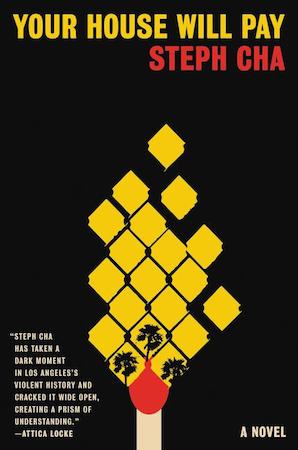
Your House Will Pay by Steph Cha
Early in the novel, Grace, a young Korean American woman, thinks about her parents in this way: “Day by day, dollar by dollar, they built new lives in this foreign place, all so she and Miriam could grow up free and clear, American.” What follows shows her that little is “free and clear” for immigrant families like hers. Or for others also struggling to realize their American Dream. Based on a real-life tragedy that helped incite the L.A. Riots, Cha writes with impressive nuance about survival in a complicated world where the distinctions between victims and perpetrators are blurred by racism and capitalism.
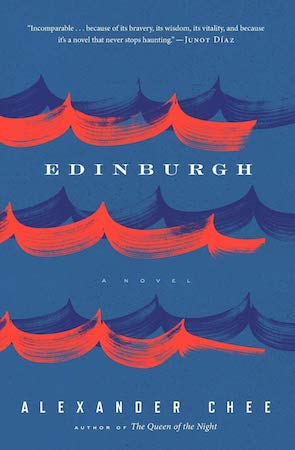
Edinburgh by Alexander Chee
I had never encountered a character like Aphias Zhe (“Fee”) before reading Chee’s novel. When asked if he’s Chinese, he answers Half: “Saying it always makes me feel split down the middle. Like a cow diagrammed for her sides of beef.” Twelve-year-old Fee’s life is further compartmentalized in the wake of the sexually predatory behavior of his choir master. In gorgeous prose that serves as a kind of grace, Chee shows us the fallout of this trauma and the ways in which Fee survives, the ways in which he’s changed.
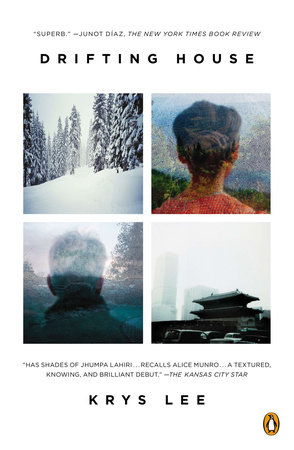
Drifting House by Krys Lee
This is one of my favorite collections of short stories, and “The Salaryman” is my favorite in this collection. Clear-eyed and unsentimental, Krys Lee takes us into the life of one of the many faceless white-collar workers one sees packed into South Korea’s subway trains, one of many not thriving in Korea’s golden economic boom. After losing his job, Mr. Seo lives on the street with other jobless men like himself, so ashamed they can’t go home to their families. Instead they spend their time waiting in line for free food, dreaming of driving trucks or working as laborers in America, contemplating selling their kidneys for cash, and lying to their families. One such man “will call his parents and his wife, as he does every week, pretending to be in America. He will tell his parents that he, the oldest son, is their guarantee. He will promise to bring his wife over after he gets settled.”
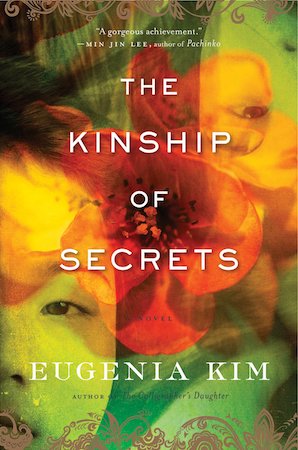
The Kinship of Secrets by Eugenia Kim
I thought a lot about the pain of separation and Korea’s division at the 38th parallel as I was reading this novel of two sisters torn apart by the vagaries of Korean history. When the family in the novel immigrates to America, they leave one child behind, for pragmatic reasons (easier to support a smaller family) and also as a placeholder, a promise to the grandmother that the family will return. They have no idea that soon the Korean War will erupt and keep them apart much longer than they anticipated. I loved this book because it showed me what life was like in Korea during the war and in its immediate aftermath, how people survived and even thrived.
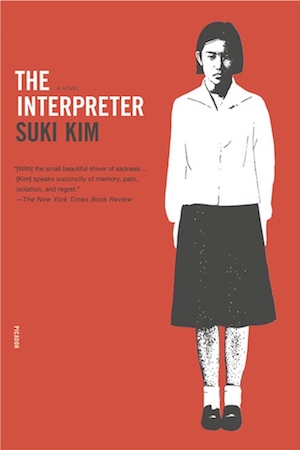
The Interpreter by Suki Kim
“Interpreting is almost a habit,” thinks Suzy Park, though for most of her life, it’s her older sister, Grace, who took on the bulk of the responsibility of translating for their immigrant parents. “Grace, since she was little, had to pore over a letter from the bank trying to make sense of words like “APR” or “Balance Transfers,” or call Con-Edison’s 800 number for payment extension.” Within this page-turning murder mystery, Suki Kim depicts the isolations that result from upended Korean parent/child relationships in a way that rings devastatingly true.
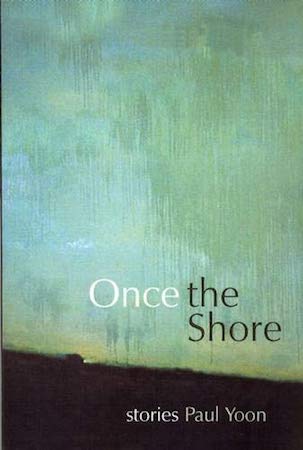
Once the Shore by Paul Yoon
It’s impossible not to fall under the spell of Paul Yoon’s spare, elegant prose in this collection of short stories. Set on a fictional island off the mainland of South Korea, there is something haunting about these stories even if they are as realist as they come. From one of my favorites, “So That They Do Not Hear Us”:
“The following year he was conscripted by the Japanese military, though to this day it was, for her, an abduction. They came for him riding horses. She clawed at their boots and the horses’ flanks. They kicked her down and she hit her head against the base of a tree. Briefly she lost consciousness. When she woke, her eyes focused on the animals and their soft sighs, their white breaths. Hooves lifting, stamping the ground. Tremendous eyes. As if they had come from myth.”
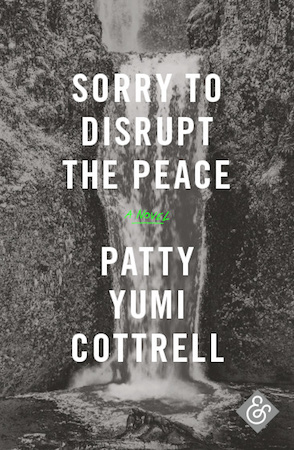
Sorry to Disrupt the Peace by Patty Yumi Cottrell
At the beginning of this funny, bittersweet novel, the main character, Helen Moran gets a call that her adopted Korean American brother died by suicide. Also adopted, also from Korea but not blood related to her brother, she says, “I was the only one, perhaps, who knew and understood him.” Deciding to become a kind of detective in order to find out why he killed himself, she returns home to her estranged parents. What follows is a confrontation with her past that finally gives Helen Moran a kind of illumination.
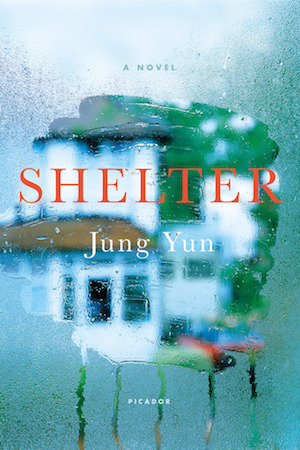
Shelter by Jung Yun
Kyung Cho, the protagonist of Jung Yun’s novel, has always struggled to be the good Korean son. Though he chose not to go to college in California when he had the chance, instead remaining near his parents in Massachusetts, he tries to keep a great distance between them.
“Brick by brick, he’s built a wall around his life, trying to preserve his family and home as his alone. He helps out his parents when asked and visits when invited, but not too often, and never as much as he should. It’s the most he’s willing to do, the absolute minimum he can get away with and still be considered a son.”
Smartly paced, Yun unfolds the violence at the heart of this family made more heartbreaking by her spare, understated prose.
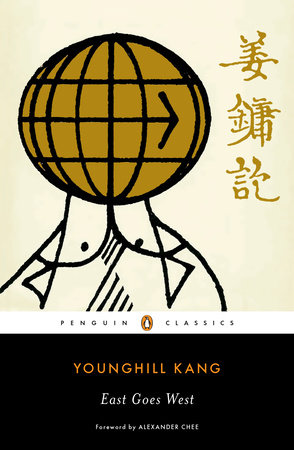
East Goes West by Younghill Kang
Published in 1937, Younghill Kang’s novel can in no way be called contemporary yet I’m including it because it still has an unmistakably modern sensibility. A romp of a novel, thanks to the ebullience of the main character, Chungpa Han, who travels across the U.S. and parts of Canada, meeting Americans of all kinds—African Americans in Harlem, a senator who picks him up hitchhiking, the wealthy men and women who hire him as houseboys and drivers. I’ll never forget the scene when he becomes a waiter at a Chinese restaurant and calculates that among the nine waiters, there “were three Ph.D.’s from Columbia, and two more to be next June; a B.A. and B.S. and one M.A.” Yet, the only work they can get is waiting tables. It reminded me too painfully of my own parents, college graduates, working in assembly-line jobs or their good friend, a professor back in Korea, whom they never failed to address as Dr. Kim.

Disappear Doppelgänger Disappear by Matthew Salesses
Matthew Salesses begins his novel with “An Abbreviated List of Disappearances” which includes the Chinese Exclusion Act of 1882, the Asiatic Barred Zone Act of 1917, and Executive Order 9066 in 1942 which effectively pushed Japanese Americans into internment camps. From there, he takes the idea of the “invisible Asian” to a whole new level. In interesting ways, Salesses plays with the ideas of identity and disappearance, beginning by giving his protagonist his own name, Matt. In fact, there are two Matts and two Yumi’s, his girlfriend, although one of them is named Sandra. Hyper-real, this novel made me laugh and think.
The post 10 Contemporary Books by Korean American Writers appeared first on Electric Literature.









